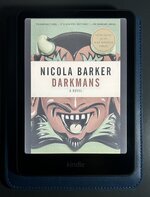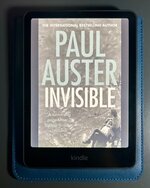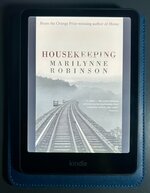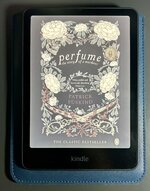avecigrec
Well-Known Member
I almost never read when I'm high
I pretty much fall asleep whenever I try to.
I almost never read when I'm high
Brighton Rock is really good and has one of the meanest antagonists I’ve read. Because it could just as easily be a modern gangster story, it can seem a bit dated at times and Greene’s return to Catholic guilt is a bit bewildering if you weren’t brought up under such a regime. Good and quick read though.Ok, I made a reading list for myself from other lists and books/authors I had already been thinking about.
These all won't be this year, but between my local library, borrow from friends, and maybe a couple purchases I'll get into this list as the year progresses.
(going to post this in the general reading thread too)
I'd love to hear any input you folks have on these; which ones are absolutely epic, or snoozefests, or whatever.
Thomas Hardy - Tess of the d'Urbervilles
Thomas Pynchon - Gravity's Rainbow
Iris Murdoch - The Sea, The Sea
Graham Greene - Brighton Rock
Virginia Wolfe - Mrs Dalloway
William Faulkner - The Sound and the Fury
Raymond Chandler - The Big Sleep
Kazou Ishiguro - where to start?
Paul Auster - where to start?
Sounds like Pynchon to me.Depending on the page, I was sometimes in awe, sometimes laughing, sometimes confused, and sometimes just plain annoyed.
This is pretty bang on. You look at the first chapter and its soldiers growing bananas in London and you kinda think it’s going to be a laugh but you get to the second and quickly realise it’s absolutely not. One of my mates once described Pynchon to me as ‘James Joyce if he’s left the last couple of shots in the bottle’ which is both really unfair and also really accurate.Are you familiar with Pynchon or other postmodern stuff? If not it's kinda hard to describe.
There's barely a plot, more like a general self aware vibe it has of itself. It runs the gamut from like ultra mathematical impenetrable descriptions of missle tech to hilariously grotesque, sexually explicit asides. It's a very funny book, but can also be devastatingly beautiful, or kind of disturbing. I took it as trying to contextualize the chaos of the 20th century but even that is probably reductive. It was one of the first books to be called an encyclopedic novel, i.e. does a little bit of everything: Encyclopedic novel - Wikipedia
My advice is to treat it like poetry, you are 100% not going to understand it all, there's just no way, but just keep reading, and let the general vibe or feeling it give you shape of the work. That's worked really well for me and Infinite Jest (less than 300 pages left!)
As mentioned by others, Gravity's Rainbow is incredibly difficult, probably the most difficult book I've read. And as @ayayrawn said, it is not a very good place to start with Pynchon. (The Crying of Lot 49 or Inherent Vice are much quicker and give you a good idea of his sort of thing.)Ok, I made a reading list for myself from other lists and books/authors I had already been thinking about.
These all won't be this year, but between my local library, borrow from friends, and maybe a couple purchases I'll get into this list as the year progresses.
(going to post this in the general reading thread too)
I'd love to hear any input you folks have on these; which ones are absolutely epic, or snoozefests, or whatever.
Thomas Hardy - Tess of the d'Urbervilles
Thomas Pynchon - Gravity's Rainbow
Iris Murdoch - The Sea, The Sea
Graham Greene - Brighton Rock
Virginia Wolfe - Mrs Dalloway
William Faulkner - The Sound and the Fury
Raymond Chandler - The Big Sleep
Kazou Ishiguro - where to start?
Paul Auster - where to start?
I cannot recommend Mason & Dixon highly enough, FYI! Probably the finest novel I have ever read, not totally baffling in the way many of his novels are (though it certainly has its own challenges: getting used to 18th-century writing style takes a while). It is essentially a buddy road novel.I’ve only read V from Pynchon and whilst I didn’t dislike it, it didn’t blow me away and to be honest, in my mind suffered from some of what I’ve written about Auster insomuch as it felt like it was trying to be a bit too clever for its own good. I’m honestly not against smart writing and smart writers, quite the opposite but, I do think V was one of those books that perhaps ignores the pleasure a reader gets from actually understanding just a bit about what is going on! I’ve half a dozen other Pynchons in my kindle library but every time I think about opening one, I’m reminded that I’ve also got hundreds of other books that are less likely to frustrate me.
Have you seen the Vintage Editions Murikami represses? Handsome jackets on them!We went on a long walk between towns over the weekend but not before stopping into a charity bookshop.
I picked up 3 Murakami books that I was missing ("Pinball, 1973", "Blind Willow, Sleeping Woman", and "What I Talk About When I Talk About Running"), a Jack Reacher ("The Secret" by Lee Child & Andrew Grant), The Maze Runner (enjoyed the film despite it being aimed towards the teen market). So plenty to read.
And to reiterate I bought these BEFORE we went walking....
Just looked and they are super nice!Have you seen the Vintage Editions Murikami represses? Handsome jackets on them!
I’ve been picking them up gradually from my local to replace my old paperbacks. They look even nicer in whatever the book equivalent to flesh is.Just looked and they are super nice!
As I Lay Dying is the only other Faulkner I've read, but it's been decades. Luckily my to-read list is so long that I can take some time deciding which of these to dive into.Have you read any other Faulkner before?
At least it is not the Dublin Prize, which has something like 70 titles in its long listI don't know, I'd say it's closer to a pile than a list...
Solenoid is fantastic, for anyone interested.
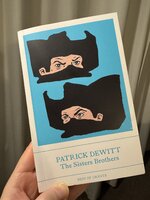
StorygraphI can't remember the post, but I thought someone mentioned an alternative to Good Reads. Anyone know?
